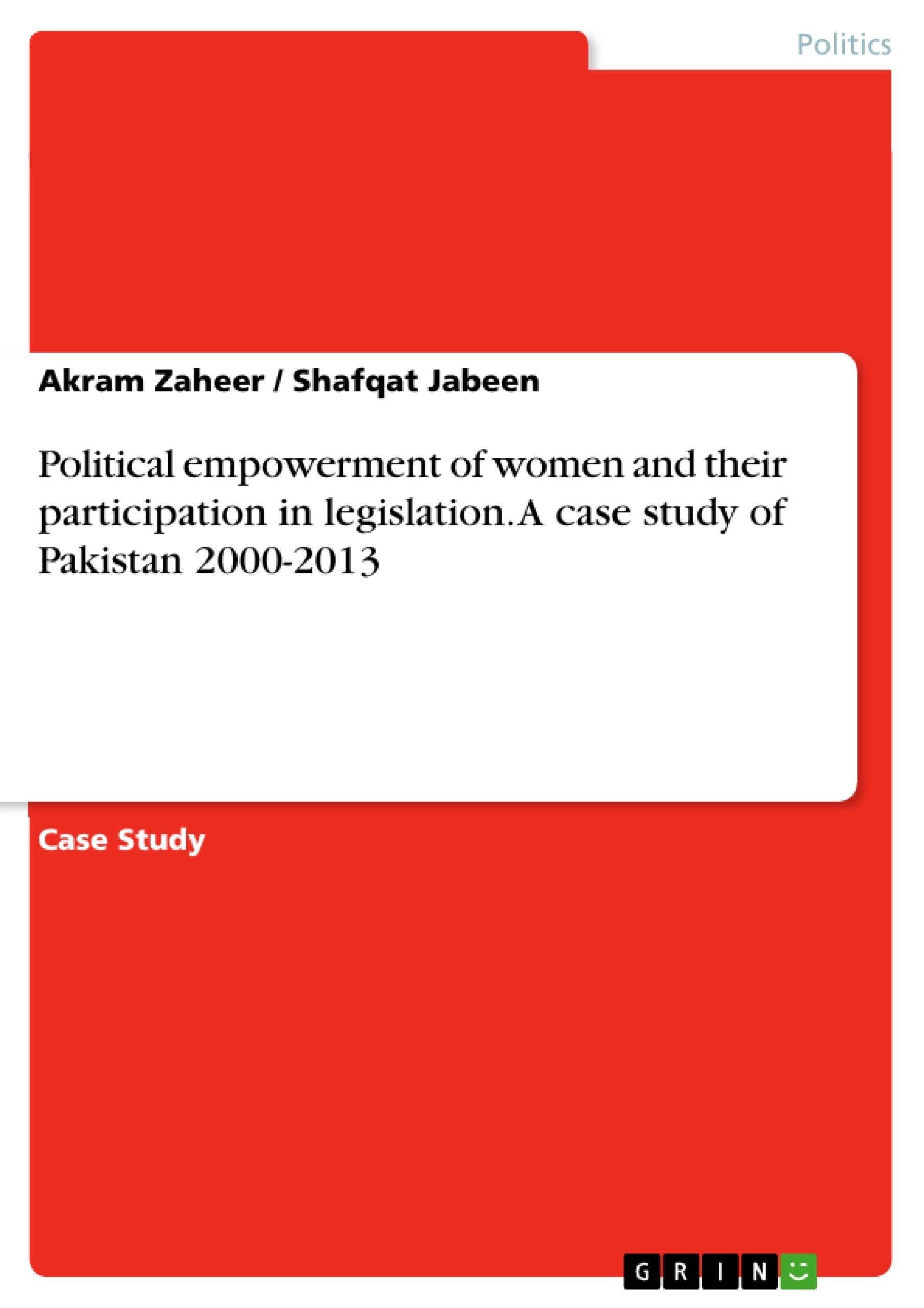The importance of political empowerment, political participation and mobilization of women in the Democratic Government are much realized in the world and in Pakistan. Women are more than 50% part of the Pakistan’s population that is not being utilized in the national development due to social norms, their low skill, less education and less empowerment in the arena of politics. Any democratic system cannot be successful with just 50% of the population while the other 50% is marginalized.
The traditional norms about women's activities as noted by different theorists have been remained generation to generation unquestioningly. The general statement in Pakistan is that the political activities belong to the "Public Sphere" and women by nature belong to the “Private Sphere” and “Politics” is something unfamiliar to their nature.
This study will explore the underlying restrictions which have hampered the growth of equal opportunities for women to play their role as an active agent of society.
Inhaltsverzeichnis (Table of Contents)
- Introduction
- THEORETICAL PERSPECTIVE OFWOMEN EMPOWERMENT AND POLITICAL PARTICIPATION
- POLITICAL EMPOWERMENT AND PARTICIPATION OF WOMEN IN PALIAMENT 2002-2013
- Election 2013
- Conclusion
Zielsetzung und Themenschwerpunkte (Objectives and Key Themes)
This study aims to explore the challenges and opportunities of women's political empowerment and participation in Pakistan, particularly focusing on the period between 2000 and 2013. It examines the factors that have hindered women's political advancement, including social norms, economic disparities, and political structures. It also investigates the impact of quota systems on women's representation in parliament and analyzes the effectiveness of these measures in promoting genuine empowerment.
- Women's Political Empowerment and Participation in Pakistan
- Social and Economic Barriers to Women's Political Advancement
- The Role of Quota Systems in Promoting Women's Representation
- The Impact of Women's Political Participation on Policy Making and Governance
- The Need for Comprehensive Strategies to Enhance Women's Political Empowerment
Zusammenfassung der Kapitel (Chapter Summaries)
The introductory chapter sets the context for the study by outlining the historical and contemporary challenges faced by women in Pakistan in their quest for political empowerment. It highlights the significance of women's participation in a democratic society and explores the socio-economic factors that contribute to their marginalization.
The chapter on theoretical perspectives provides a framework for understanding the concept of women's empowerment and its relationship to political participation. It draws on various theoretical approaches to analyze the historical and contemporary debates surrounding women's roles in politics and society.
The chapter on political empowerment and participation of women in parliament examines the evolution of women's representation in Pakistan's legislative bodies from 2002 to 2013. It analyzes the impact of quota systems on women's political participation and assesses the effectiveness of these measures in promoting genuine empowerment.
Schlüsselwörter (Keywords)
The study focuses on the key themes of political empowerment, women's participation, political mobilization, patriarchal society, social norms, customs, social laws, and low levels of socio-economic indicators. It examines the impact of these factors on women's political representation and decision-making power in Pakistan.
Frequently Asked Questions
What are the main barriers to women's political participation in Pakistan?
Key barriers include restrictive social norms, patriarchal structures, low levels of education, and economic disparities that marginalize women in the public sphere.
How did the quota system impact women's representation in Pakistan (2002-2013)?
The quota system significantly increased the number of women in parliament, though the study explores whether this led to genuine empowerment or remained purely descriptive.
What is the distinction between the 'Public' and 'Private' spheres in this context?
Traditional norms in Pakistan often relegate women to the "Private Sphere" (home), while "Politics" is viewed as part of the "Public Sphere" dominated by men.
What was the significance of the 2013 elections for women in Pakistan?
The 2013 elections were a milestone in analyzing the progress and continued challenges of women's mobilization and their role as active agents in society.
Why is women's political empowerment essential for democracy in Pakistan?
Since women make up over 50% of the population, a democratic system cannot be truly successful or representative if half of its citizens are marginalized from decision-making.
What socio-economic indicators affect women's political mobilization?
Factors such as skill levels, literacy rates, and financial independence are crucial indicators that directly correlate with the level of women's political empowerment.
- Quote paper
- Akram Zaheer (Author), Shafqat Jabeen (Author), 2014, Political empowerment of women and their participation in legislation. A case study of Pakistan 2000-2013, Munich, GRIN Verlag, https://www.grin.com/document/341908



